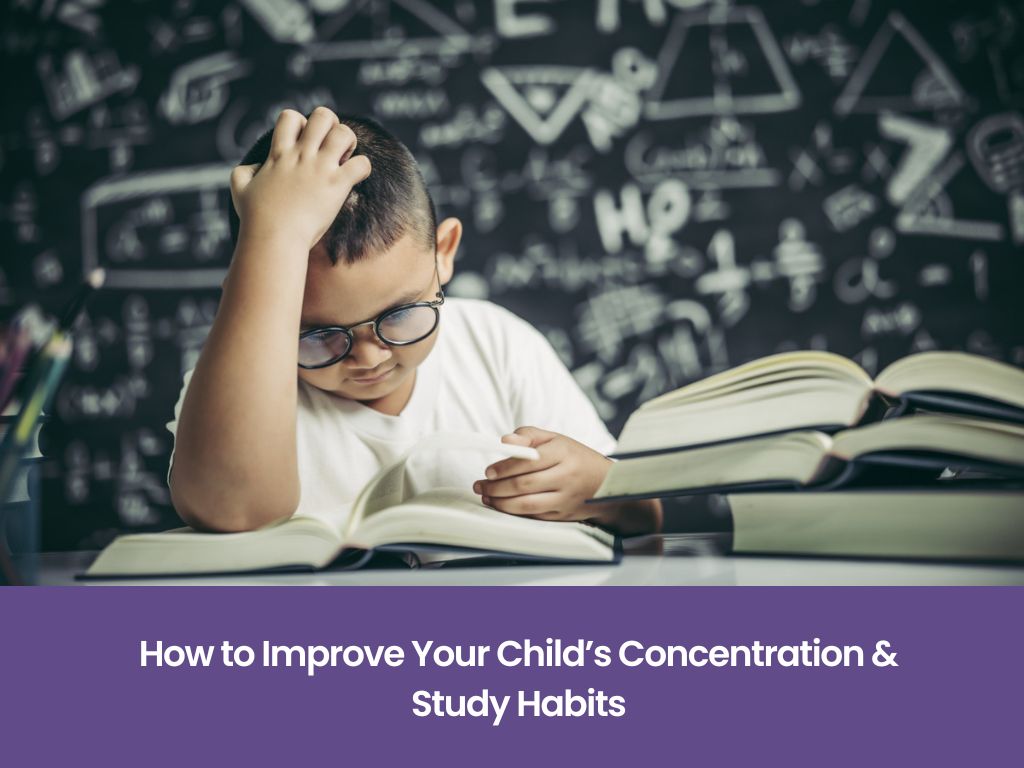How to Improve Your Child’s Concentration & Study Habits
posted on Jun 26, 2025
Discover practical tips to boost your child’s concentration and study habits. Build focus, discipline, and academic success with these proven strategies.

Introduction
In a world full of distractions—screens, social media, fast-paced routines—it has become increasingly difficult for children to concentrate and maintain effective study habits. Concentration is a vital skill that helps children absorb information, retain what they learn, and apply it in real life. Coupled with strong study habits, it lays the groundwork for academic success, emotional growth, and lifelong learning.
Why Focus and Good Study Habits Are Crucial
Without proper focus, children often feel overwhelmed, anxious, and demotivated. Similarly, lack of structured study routines leads to poor academic outcomes, low confidence, and even behavioral issues. Parents, educators, and schools must work together to cultivate an environment that supports a child's ability to focus and develop healthy learning practices.
Common Causes of Poor Concentration in Children
- Too much screen time (TV, phones, games)
- Irregular sleep patterns and poor nutrition
- Over-scheduling or lack of routine
- Disinterest in subjects due to rigid or passive teaching methods
- Emotional stress or anxiety
Identifying the root causes is the first step toward helping children improve their attention span and productivity.
Effective Ways to Improve Your Child’s Concentration
1. Establish a Fixed Routine
Children feel more secure and perform better when they follow a predictable routine. Set specific times for study, play, meals, and sleep. A consistent structure signals the brain when it's time to focus, rest, or relax.
2. Design a Distraction-Free Study Zone
Create a clean, quiet, and well-lit space solely for studying. Avoid placing the study desk near noisy areas like the TV room or kitchen. Ensure the area has all necessary school supplies to reduce movement and interruptions.
3. Use the Pomodoro Technique
This time management method involves 25 minutes of focused work followed by a 5-minute break. It prevents burnout and keeps the mind alert. For younger kids, you can start with 15-20 minute sessions and increase gradually.
4. Encourage Breaks and Physical Activity
Long hours of sitting can drain energy and reduce mental sharpness. Let children stretch, go for a short walk, or engage in light play between study sessions. Physical activity improves blood flow to the brain and boosts memory and focus.
5. Provide Brain-Boosting Nutrition
A balanced diet rich in proteins, omega-3s, whole grains, fruits, and vegetables supports brain function. Avoid sugary snacks and caffeinated drinks during study time, as they can cause energy crashes and restlessness.
6. Encourage Reading and Mind Games
Reading stimulates imagination and concentration. Involve your child in puzzles, memory games, Sudoku, or chess to sharpen focus and critical thinking.
7. Involve Children in Planning
When children are involved in setting their goals and creating their study schedule, they feel more responsible and motivated. Let them decide the order of subjects, duration, and break timings under your guidance.
8. Introduce Mindfulness and Breathing Exercises
Practicing mindfulness helps children center their attention on the present moment. Even a few minutes of deep breathing before study time can calm their nerves and boost attention span.
9. Encourage Activity-Based Education
Learning through hands-on experiences helps children understand concepts better. Activity-Based Education makes lessons engaging and improves memory retention by linking learning with action.
10. Promote Holistic Learning
Academic achievement is important, but so are emotional intelligence, creativity, and values. Holistic learning that includes arts, sports, music, and life skills helps children become well-rounded individuals and improves cognitive functions like focus and memory.
Helping Your Child Build Better Study Habits
Along with improving concentration, instilling proper study habits will benefit your child for years to come. Here are key habits to develop:
- Start homework or revision at the same time each day
- Use a planner or calendar to track assignments and exams
- Teach your child how to set short-term and long-term goals
- Reward consistency and effort, not just results
- Limit multitasking—focus on one subject or task at a time
The Role of Parents and Teachers
Support from both home and school is essential in building strong concentration and study habits. Communicate regularly with teachers to track academic progress and behavioral changes. Celebrate improvements, no matter how small, and avoid harsh criticism, which can lead to anxiety or avoidance.
The School’s Contribution to Concentration and Learning
Schools play a vital role by creating environments where children feel safe, supported, and engaged. Interactive teaching methods, open communication, and access to resources like counseling and learning support can make a big difference. For example, Bgs vijnatham, one of the Best School in Noida Extension, emphasizes a balanced approach to education that helps students develop focus, curiosity, and a love for learning.
Conclusion
Improving your child’s concentration and study habits takes time, consistency, and support. With the right environment, healthy routines, and encouragement, children can overcome distractions and become focused, independent learners. These early habits not only enhance academic performance but also build the foundation for personal growth, discipline, and success in life.